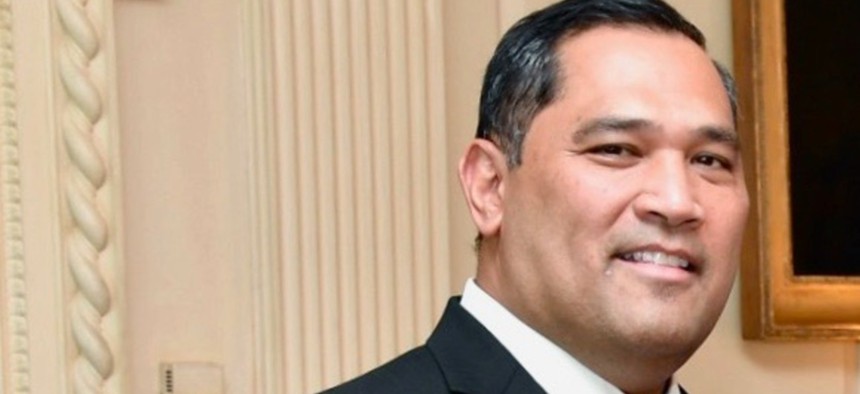
Brian Bulatao, undersecretary for management at State, testified the IG was not performing well. Michael Gross / State Department
High-Ranking State Dept. Official Testifies IG Was Not Ousted for Political Retaliation
Four months after the firing, questions linger over exactly what happened.
A top State Department official on Wednesday told lawmakers that the department's inspector general was ousted in the spring for failing to uphold the office's responsibilities and values, rather than for political retaliation.
Three top officials testified before the House Foreign Affairs Committee about President Trump’s firing of IG Steve Linick in May. It was later revealed Linick was looking into potential misuse of government resources and funds by Secretary of State Mike Pompeo and the administration's weapons sale to Saudi Arabia. Pompeo told The Washington Post on May 18 that he did ask the president to fire Linick, but said it was not political retaliation because he didn’t know about what Linick was investigating. Four months after the firing questions linger over exactly what happened.
“We rely on the role of the IG to serve as a catalyst for effective management and internal controls. Unfortunately, Steve Linick did not fulfill this role,” said Brian Bulatao, undersecretary for management at State. “The IG’s removal was not about retaliation on any specific report or investigation. There have been a variety of unsubstantiated allegations in the media that the secretary recommended removal of the IG because of some awareness of these investigations. Nothing could be further from the truth.”
Bulatao argued Linick “failed to perform” as shown by the IG office’s late submission of the fiscal 2019 financial audit; low morale and satisfaction among staff in his office (as measured in the Federal Employee Viewpoint Survey); failure to fill the deputy IG and general counsel roles; and leak of a report to the media and mishandling of a subsequent investigation on it. Bulatao also said, “year over year” (without giving a specific start date) that the number of inspections at overseas posts decreased by about 10% up until March 2019 and preliminary inquiries closed by the IG office declined by 27% up until March 2020.
The undersecretary for management testified he was present on the call in which the deputy secretary fired Linick and said the president “lost confidence” in him. However, he would not say if he recommended to Pompeo that he fire him and would not comment on his private conversations with the secretary.
Despite Bulatao’s explanation, Linick said during a closed-door interview with House lawmakers in June that he was “given no valid reason that would justify my removal” and the justifications he’s seen in the press “are either unfounded or misplaced,” according to the transcript released by the Democrats. He also said that Bulatao bullied him on several occasions, tried to take over one of his investigations and didn’t understand the role of IGs.
Republicans largely agreed with the decision and justification to fire Linick. Rep. Scott Perry, R-Pa., said he “was a threat to the principle of accountability in government, plain and simple.”
Meanwhile, Democrats were more skeptical. Rep. Gregory Meeks, D-N.Y., noted there are “multiple, after-the-fact reasons” for the firing and suggested there could be a cover-up involved. Others pointed to news reports that painted a conflicting and/or muddled picture, such as The New York Times report that Pompeo was aware of at least one of the former IG’s investigations.
Also, Rep. Brad Sherman, D-Calif., cast doubt that the firing was in part due to a late audit report. As “co-chair of the bipartisan [certified public accountant] caucus and the only professional auditor in this room, I assure you that is not the reason” Linick was fired,” Sherman said. The State Department submitting its audit report a few weeks late is “tiny compared to other agencies and their late or non-existent audit reports.”
The other witnesses did not give the same lengthy rationale for Linick’s ousting as Bulatao did. R. Clarke Cooper, assistant secretary of state for political-military affairs, said he didn’t know why it happened and Marik String, State Department acting legal adviser, testified that the president was in his authority to fire Linick; however, they defended their department’s actions and justifications on matters discussed.







